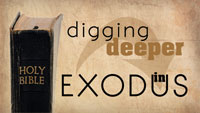 FBC has been studying the book of Exodus so far this year in conjunction with our 2011 theme Living Life Together. The book of Exodus details how God wants to create a people for Himself and dwell among their midst. God continues that plan today through His local churches across the world.
FBC has been studying the book of Exodus so far this year in conjunction with our 2011 theme Living Life Together. The book of Exodus details how God wants to create a people for Himself and dwell among their midst. God continues that plan today through His local churches across the world.
Each week on Mondays during the Exodus series, this blog will go a bit deeper into Exodus. Also, questions about Exodus are encouraged in the comments. I will be happy to address them.
Don’t have a clue what Exodus is all about? Well here is a little strategy for reading the book of Exodus to provide the framework for getting all the nuggets of truth out of this great book. Read the beginning and ending. That’s right. If you read the beginning and ending of the book, you begin to notice some themes that are developed in the middle of the book.
God Blessing and Filling the Earth with His People
Notice the key words of “bless” and “fill” in Exodus 1:7 and their repetition at the end of Exodus. Notice what they have in common with the original creation mandate in Gen 1:28.
- Gen 1: 28 God blessed them; and God said to them, “Be fruitful and multiply, and fill the earth
- Ex. 1:7 But the sons of Israel were fruitful and increased greatly, and multiplied, and became exceedingly mighty, so that the land was filled with them.
- Ex. 39:43 Moses inspected the work and saw that they had done it just as the Lord had commanded. So Moses blessed them.
- Ex. 40:34 Then the cloud covered the Tent of Meeting, and the glory of the Lord filled the tabernacle. 35 Moses could not enter the Tent of Meeting because the cloud had settled upon it, and the glory of the Lord filled the tabernacle.
God desires to bless His people by filling the earth with them and then filling them with His glory so that they may spread His fame across the earth.
Laboring for the Kingdom of God instead of the Kingdom of Man
At the beginning of Exodus, God’s people are enlisted to be the builders of Pharaoh’s kingdom. In reality they are Abraham’s descendents and are servants of the one true God, Yahweh. At the end of the Exodus story, they are no longer building for Pharaoh. God has made them His special people (Exodus 19:6). And, they are building again, but this time not for Pharaoh, but for God—His dwelling place among them, the tabernacle. So the beginning and the ending of the Exodus story demonstrate how God wants to take a people from building that kingdom of man to establishing the Kingdom of God on this earth. Remember Jesus’ prayer in Matthew 6 —“Thy Kingdom Come, Thy will be done on earth as it is in heaven?”
Transitioning from Slavery to Service
When you think of Exodus, what do you think of? Many would say, “the parting of the Red Sea,” or “the plagues,” or “the slavery of the people.” In Exodus, God’s people transition from slavery at the beginning of the book to servants of God at the end of the book. The literal slavery experience of God’s people is picked up later in Scriptures and used as a metaphor for our slavery to sin. This bondage is broken when Jesus Christ sets an individual free and makes the individual His servant.
Struggling to make sense of it all? Get the proper framework with these three themes and watch how the story develops. The beginning and the ending of the story give the story away. I hope you will enjoy the time in Exodus with us here at FBC. For those who want some more intense reading on this topic, here is an intense article. Any questions from chapters 1-6 yet?
 Church
Church